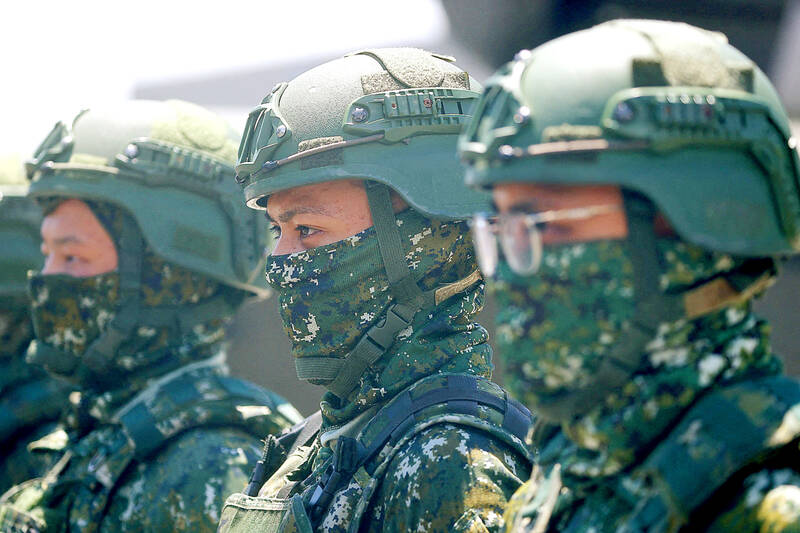The number of volunteer enlisted soldiers determined unfit for active duty reached 4,066 last year, a record high, a Ministry of National Defense report showed.
Starting next year, Taiwan is to restore compulsory military service to one year for men who were born in 2005 or later, and who are aged 18 or older.
However, as many young men go to college or university after graduating from high school, the ministry expects there to only be about 9,100 draftees serving the one-year compulsory military service next year, reaching about 35,000 draftees in 2027.

Photo: Ann Wang, Reuters
However, the main force to defend the nation’s land, waters and airspace would be volunteer enlisted soldiers, it said.
According to the Act of Military Service for Volunteer Enlisted Soldiers (志願士兵服役條例), military service for volunteer enlisted soldiers cannot be less than four years, but the act was amended in 2009 to allow unsuitable volunteer enlisted soldiers the option of early release after three months of service, with a requirement to pay compensation.
About 20 percent of volunteer soldiers enlisted in the past five years paid the compensation to be released early, the legislature’s Foreign Affairs and Defense Committee said after last year’s review of the defense ministry’s budget.
The military’s limited training resources are being wasted, it said, adding that compensation-related issues is also a burden on the Ministry of Defense.
The committee made a resolution requiring the ministry to file a report on the analysis of the reasons volunteer enlisted soldiers were determined unfit for active duty, and its improvement methods.
There were 4,066 soldiers unfit for active duty last year, including 3,756 — 92.4 percent — who applied for early release, and 310 — 7.6 percent — who were expelled for receiving three major demerits or two major demerits and an annual performance grade of “C” or below within a year, a ministry report said.
When soldiers were asked why they applied for early release, 43.2 percent said they “have different career plans,” 35.2 percent said they “suffered from maladaptation,” 16 percent said it was due to “family reasons” and 3.6 percent said they had “physical problems or illnesses,” the report said.
The 1,322 soldiers who “suffered from maladaptation” included 766 who “could not adapt to military life,” 156 who “could not agree with troop management” and 137 who “could not agree with military culture,” it said.
Of the 310 soldiers expelled from military service, 22.6 percent had experienced traffic accidents outside the military camp, 21 percent had engaged in drunk driving, 16.5 percent had engaged in gambling and 11 percent had engaged in misconduct outside the military camp, the report said.
The report said the ministry would continue to enhance its new recruit orientation program, analyze the pros and cons of careers within the military and in the private sector, avoid imposing excessive limitations or giving sudden duties that could affect soldiers’ holiday plans, and present a military career vision for volunteer enlisted soldiers, while training them with professional skills.
With the low birthrate and increased salaries for conscripted soldiers, the army must adjust its overall labor planning, replace old equipment and develop military automation systems, Institute for National Defense and Security Research analyst Shu Hsiao-huang (舒孝煌) said.

Chinese Nationalist Party (KMT) Chairman Eric Chu (朱立倫), spokeswoman Yang Chih-yu (楊智伃) and Legislator Hsieh Lung-chieh (謝龍介) would be summoned by police for questioning for leading an illegal assembly on Thursday evening last week, Minister of the Interior Liu Shyh-fang (劉世芳) said today. The three KMT officials led an assembly outside the Taipei City Prosecutors’ Office, a restricted area where public assembly is not allowed, protesting the questioning of several KMT staff and searches of KMT headquarters and offices in a recall petition forgery case. Chu, Yang and Hsieh are all suspected of contravening the Assembly and Parade Act (集會遊行法) by holding

PRAISE: Japanese visitor Takashi Kubota said the Taiwanese temple architecture images showcased in the AI Art Gallery were the most impressive displays he saw Taiwan does not have an official pavilion at the World Expo in Osaka, Japan, because of its diplomatic predicament, but the government-backed Tech World pavilion is drawing interest with its unique recreations of works by Taiwanese artists. The pavilion features an artificial intelligence (AI)-based art gallery showcasing works of famous Taiwanese artists from the Japanese colonial period using innovative technologies. Among its main simulated displays are Eastern gouache paintings by Chen Chin (陳進), Lin Yu-shan (林玉山) and Kuo Hsueh-hu (郭雪湖), who were the three young Taiwanese painters selected for the East Asian Painting exhibition in 1927. Gouache is a water-based

Taiwan would welcome the return of Honduras as a diplomatic ally if its next president decides to make such a move, Minister of Foreign Affairs Lin Chia-lung (林佳龍) said yesterday. “Of course, we would welcome Honduras if they want to restore diplomatic ties with Taiwan after their elections,” Lin said at a meeting of the legislature’s Foreign Affairs and National Defense Committee, when asked to comment on statements made by two of the three Honduran presidential candidates during the presidential campaign in the Central American country. Taiwan is paying close attention to the region as a whole in the wake of a

OFF-TARGET: More than 30,000 participants were expected to take part in the Games next month, but only 6,550 foreign and 19,400 Taiwanese athletes have registered Taipei city councilors yesterday blasted the organizers of next month’s World Masters Games over sudden timetable and venue changes, which they said have caused thousands of participants to back out of the international sporting event, among other organizational issues. They also cited visa delays and political interference by China as reasons many foreign athletes are requesting refunds for the event, to be held from May 17 to 30. Jointly organized by the Taipei and New Taipei City governments, the games have been rocked by numerous controversies since preparations began in 2020. Taipei City Councilor Lin Yen-feng (林延鳳) said yesterday that new measures by